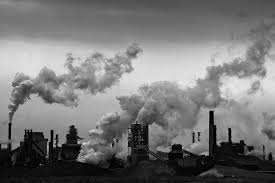April 17, 2014
BURLINGTON, ON.
Skeptics will point to the winter we’ve just experienced and ask: “what global warming”? But that is not what the International Panel on Climate Change (IPCC) is saying. They’re saying global climate change is real and getting worse, and that there is still time to take action to help mitigate it. According to the IPCC, global greenhouse gas emissions (GHG) grew over the last decade at double the rate of the previous three decades and over 60% since 1990.
I recall preparing materials, back In1992, for Canada’s Environment Minister, Jean Charest, as he was heading out to represent us at the Rio Earth Summit. Canada played a leadership role in promoting action on climate change there. We did so again in 1997 when we signed the Kyoto protocol; and again when we ratified it in 2002. But Canada stopped trying to reduce its GHG emissions once Mr. Harper formed the government in 2006.
Not that our trying had ever amounted to much. The Chretien/Martin governments’ various strategies and programs mostly went nowhere and the goals we’d set for ourselves became ever more elusive.
When it was clear we’d never reach our goals, Mr. Harper changed the goal posts, and pulled Canada out of Kyoto once he had a majority in 2011. Our PM never seemed to believe in climate change anyway, and his every action confirms that. So it was not a surprise when we saw his vision of Canada as the Saudi Arabia of the north, exploiting and exporting fossil fuels to the world.
Some say the 1997 Kyoto Protocol was flawed since the developing nations were not required to reduce their emissions. The US Congress passed a resolution against ratifying it for that reason, despite the role played by the US in drafting the Protocol. Proponents of the Protocol arguing that major economies should lead by example, something they haven’t done – at least not in the case of Canada or the USA. By contrast, European nations have at least struggled to reduce and maintain their emissions.
At the Rio Earth Summit in 1992, there was an emerging consensus about climate change and the need to change our ways. World leaders foresaw that one day the developing world would surpass North America and Europe in carbon emissions. That day has come. China increased its CO2 emissions astronomically, such that by 2006 it had become the world’s largest greenhouse gas emitter.
Electricity plants fueled by coal are the most polluting of all sources and there are about a thousand or so plants in the works, globally. China’s coal plants make up a whacking 15% of global emissions and it gets two-thirds of all its electricity from burning coal. As a consequence some three-quarters of a million people die every year in China just from coal related health effects.
So it was a good piece of news, in this sombre picture, that Ontario announced it has entirely phased out electricity production from coal, I was the first jurisdiction in North America to do so, joining British Columbia and Quebec which produce electricity without coal. Natural gas, even though it is less polluting, will still be kept in the quiver to complement solar, wind, hydro nuclear and biomass. The province isn’t off fossil fuels entirely, just the dirtiest one.
The provincial government’s renewable energy program has been cited by so many people as the source of high electricity bills that everybody is starting to believe it. The truth is that only a small portion of the electricity rate increases reflect switching from coal to the alternatives. Why would we expect prices for electrical energy to stay constant? Shouldn’t we keep this in perspective – get a grip? Have we checked the gasoline pump prices lately? Didn’t natural gas prices jump up by 40% this year?
And then somebody brings up that costly McGuinty gas plant fiasco, from a couple years ago, and we all just get angry about the rates again. Reading the latest IPCC report can be pretty depressing, even more than ruminating about escalating energy prices. If you live in Ontario you can take a little comfort from the fact that we were the only Canadian province to significantly reduce GHG emissions over the last decade – a little shining star in an otherwise dark and troubled sky.

If this kind of melting keeps happening – climate will be changed to the point where we cannot recover.
 Ray Rivers writes weekly on both federal and provincial politics, applying his more than 25 years as a federal bureaucrat to his thinking. Rivers was a candidate for provincial office in Burlington where he ran against Cam Jackson in 1995, the year Mike Harris and the Common Sense Revolution swept the province. He developed the current policy process for the Ontario Liberal Party.
Ray Rivers writes weekly on both federal and provincial politics, applying his more than 25 years as a federal bureaucrat to his thinking. Rivers was a candidate for provincial office in Burlington where he ran against Cam Jackson in 1995, the year Mike Harris and the Common Sense Revolution swept the province. He developed the current policy process for the Ontario Liberal Party.
Background links:
Clean Energy An Anti-apartheid Approach Germany’s Green Dreams B.C.’s LNG IPCC Report Harrison Ford Conference Board
Carbon Emissions CO2 From New Zealand Climate Change Olympics Measuring What Matters Tipping Points
Provincial Emissions GHG per Capital
Editor’s note: Someone recently said, on one of the David Suzuki programs, that the amount of energy used when two Google searches are done is equivalent to the amount of energy needed to boil enough water to make a cup of team. The speaker was arguing that our focus should not be on the supply side of the energy question but rather on the demand side.





















Even as the Global Warming deniers remain angry at the rest of the world, I have never heard them explain why it is not good policy to reduce our contribution to global greenhouse gas emissions when we can reasonably do so.
Even if the human contribution to the increase in global greenhouse gas emissions is only a part of the total problem, surely it comes at the expense of a finite petroleum resource. Will our future generations have to clean up our degraded environment filled with toxic tar sands waste even without the benefit of adequate resources? Did we learn no lesson from the Sydney Tar Ponds fiasco?
Corporations care only about the next set of financial statements and executive recompense. Right-wing politicos care only about corporations and the next election. Who cares about those who are not even yet born? If we don’t, we deserve extinction. If Easter is all about sacrifice and we celebrate it, why should we not apply it to our own decision-making?